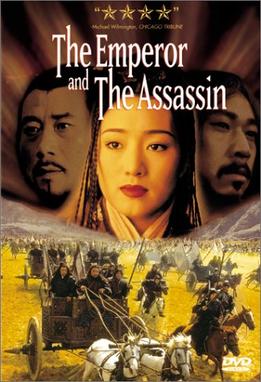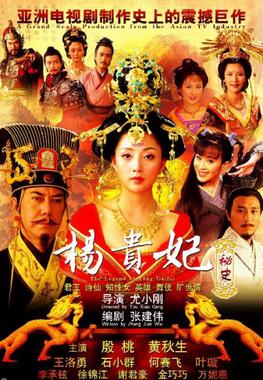
Yang Yuhuan, often known as Yang Guifei, and known briefly by the Taoist nun name Taizhen (太真), was the beloved consort of Emperor Xuanzong of Tang during his later years. She is known as one of the Four Beauties of ancient China.

Wang Qiang, commonly known by her courtesy name Wang Zhaojun was known as one of the Four Beauties of ancient China. Born in Baoping Village, Zigui County in the Western Han dynasty, she was sent by Emperor Yuan to marry Chanyu Huhanye of the Xiongnu Empire in order to establish friendly relations with the Han dynasty through marriage.

Chen Kaige is a Chinese filmmaker. A leading figure of the fifth generation of Chinese directors, Chen is known for his visual flair and epic storytelling. Chen won the Palme d'Or at 1993 Cannes Film Festival and the International Federation of Film Critics (FIPRESCI) Award in 1993 for directing Farewell My Concubine.

Bai Juyi, courtesy name Letian (樂天), was a Chinese musician, poet, and politician during the Tang dynasty. Many of his poems concern his career or observations made about everyday life, including as governor of three different provinces. He achieved fame as a writer of verse in a low-key, near vernacular style that was popular throughout medieval East Asia.

Bao Zheng, commonly known as Bao Gong, was a Chinese politician during the reign of Emperor Renzong in China's Song Dynasty. During his twenty-five years in civil service, Bao was known for his honesty and uprightness, with actions such as impeaching an uncle of Emperor Renzong's favourite concubine and punishing powerful families. His appointment from 1057 to 1058 as the prefect of Song's capital Kaifeng, where he initiated a number of changes to better hear the grievances of the people, made him a legendary figure. During his years in office, he gained the honorific title Justice Bao due to his ability to defend peasants and commoners against corruption or injustice. Bao Zheng is depicted as the incarnation of the Astral God of Civil Arts, while another protagonist — famous Northern Song warrior Di Qing as the Astral God of Military Arts.

The Emperor and the Assassin, also known as The First Emperor, is a 1998–1999 Chinese historical romance film based primarily on Jing Ke's assassination attempt on the King of Qin, as described in Sima Qian's Records of the Grand Historian. The film was directed by Chen Kaige and stars Gong Li, Zhang Fengyi, Li Xuejian, and Zhou Xun. The film was well received critically and won the Technical Prize at the 1999 Cannes Film Festival. It was the most expensive Chinese film made up to that time, costing US$20 million.

Handan is a prefecture-level city located in the southwest of Hebei province, China. The southernmost prefecture-level city of the province, it borders Xingtai on the north, and the provinces of Shanxi on the west, Henan on the south and Shandong on the east. At the 2010 census, its population was 9,174,683 inhabitants whom 2,845,790 lived in the built-up area made of 5 urban districts. Yongnian District in Handan and Shahe City in Xingtai have largely formed into a single conurbation.

Zhong Kui is a Taoist deity in Chinese mythology, traditionally regarded as a vanquisher of ghosts and evil beings. He is depicted as a large man with a big black beard, bulging eyes, and a wrathful expression. Zhong Kui is able to command 80,000 demons to do his bidding and is often associated with the five bats of fortune. Worship and iconography of Zhong Kui later spread to other East Asian countries, and he can also be found in the folklores and mythologies of Korea, Japan, and Vietnam.
Chang Hen Ge is a literary masterpiece from the Tang dynasty by the famous Chinese poet Bai Juyi (772–846). It retells the love story between Emperor Xuanzong of Tang and his favorite concubine Yang Guifei (719–756). This long narrative poem is dated from 809.

Centro Digital Pictures Limited was a visual special effects and animation company based in Hong Kong that provided visual effects for film, interactive media, and video games.

Three Kingdoms is a 2010 Chinese television series based on the events in the late Eastern Han dynasty and the Three Kingdoms period. The plot is adapted from the 14th century historical novel Romance of the Three Kingdoms and other stories about the Three Kingdoms period. Directed by Gao Xixi, the series had a budget of over 160 million RMB and took five years of pre-production work. Shooting of the series commenced in October 2008, and it was released in China in May 2010.

Journey to the West is a Chinese television series adapted from the 16th-century novel of the same title. Production for the 66 episodes long series started on 12 September 2009, and it was first broadcast in mainland China on 28 July 2011 on TVS. The series was produced by Zhang Jizhong and was released a year later than another television series of the same title, but with a different cast and crew.

Huaqing Pool (華清池), also known as the Huaqing Hot Springs (華清宫), are a complex of hot springs located in an area characterized by mild weather and scenic views at the northern foot of Mount Li, one of the three major peaks of the Qinling. The Huaqing Hot Springs are located approximately 25 kilometers (16 mi) east of Xi'an, in the province of Shaanxi, China.

The Legend of Yang Guifei, also known as The Secret History of Concubine Yang, is a Chinese television series loosely based on the romance between Emperor Xuanzong of the Tang dynasty and his consort Yang Yuhuan. The series was directed by You Xiaogang and starred Yin Tao and Anthony Wong as the couple. It was first broadcast on Hunan Satellite TV from April to May 2010.

The Mausoleum of the First Qin Emperor is the mausoleum of Qin Shi Huang, the first emperor of the Qin dynasty.

Lady of the Dynasty is a Chinese epic romance war film directed by Cheng Shiqing and featuring Fan Bingbing, Leon Lai and Wu Chun. The film also had a director group including Zhang Yimou and Tian Zhuangzhuang. The film was released on 30 July 2015.
Bao Jianfeng is a Chinese actor and singer of Mongolian descent, best known in film for portraying Mao Zedong in The Road of Exploring (2011), Lü Bu in The Assassins (2012) and Chen Shuxiang in The Bloody of Xiangjiang River, and has received critical acclaim for his television work, particularly as Gu Yuetao in The Shining Teenagers (2002), Gaozong of Tang in Lady Wu: The First Empress (2004), Wei Zheng in The Prince of Qin, Li Shimin (2005), Xue Rengui in The Legend of Xue Rengui (2006), Chu Lian in Dreams Link, and King Zhou of Shang in Zhaoge.
Xin Baiqing is a Chinese actor best known for portraying Li Bai in Legend of the Demon Cat (2017) and Guan Xiaohe in Four Generations under One Roof (2010), which garnered him a Best Performance Award at the 2012 Golden Lion Award.

Zhaoyao, also known as The Legends, is a 2019 Chinese television series starring Bai Lu, Xu Kai, Dai Xu and Xiao Yan. It is based on the novel of the same name by Jiuliu Feixiang. It aired on Hunan TV from January 28 to April 3, 2019.
















